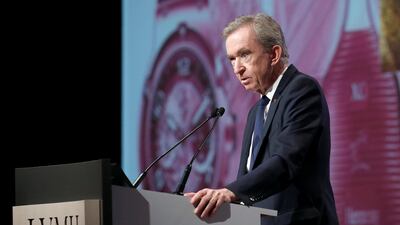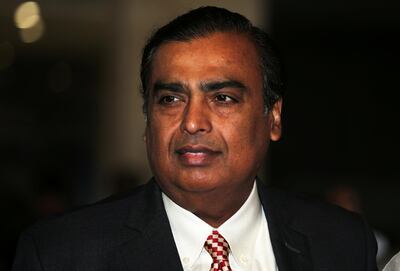Bernard Arnault
France's richest man Bernard Arnault hit out last week at critics of his rush to donate tens of millions of euros to the restoration of Notre-Dame cathedral, saying he would not benefit from tax breaks and branding the sniping as petty.
Luxury goods group LVMH, owner of Louis Vuitton, Moet, Hennessy, and its founding Arnault family announced a combined €200 million (Dh826m) pledge hours after a fire on Monday ravaged the Paris landmark.
It followed a €100m offer from Mr Arnault's arch rival Francois-Henri Pinault, the chief executive of Gucci-owner Kering, and sparked a frenzy of donations from some of France's top companies that pushed the funds raised to close to €1 billion.
But the outpouring also prompted questions from charities, politicians and commentators about why some corporate donors had offered so much so quickly, including speculation regarding tax break benefits. Some expressed frustration that other disasters had not received similar support.
Mr Arnault told LVMH's shareholder meeting that his family holding company was not at the moment eligible for tax breaks on charitable donations, which under French law can qualify for a 60 per cent deduction.
He added the luxury goods company had hit its ceiling on tax breaks after those it received in recent years for building the Louis Vuitton Foundation.
"It's an empty controversy," Mr Arnault said. "It's pretty dismaying to see that in France you are criticised even for doing something for the general interest."
Mr Pinault's family holding company said last week it did not intend to seek tax breaks on its donation. Mr Pinault's wife, actress Salma Hayek, also defended him in a post on Instagram.
"My husband and father-in-law are two generous French citizens, who sincerely understand the importance of this spiritual, cultural and historical treasure from Paris to the world," she wrote.
Critics of the donations included worker unions in France, who said it was galling that funds could not be found for social problems.
Eric Yuan
Zoom’s chief executive Eric Yuan has become a billionaire after the video conference services firm raised $751m in an initial public offering last week.
Mr Yuan and his family sold stock worth $57m, based on Zoom’s IPO price of $36 a share. The company’s shares soared to $62.71 after they began trading on New York’s Nasdaq Global Select Market, valuing Mr Yuan and his family’s stake at $3.2bn, according to the Bloomberg Billionaires Index.
The China-born entrepreneur credits a speech about the internet from Microsoft co-founder Bill Gates three decades ago for inspiring him to want to become part of the Silicon Valley dot-com boom. Then the US government denied his visa application eight times before he finally made it there.
Mr Yuan, 49, joins Alphabet’s Sergey Brin, Nvidia’s Jensen Huang and Tesla’s Elon Musk as immigrants who became billionaires after helping create Silicon Valley companies. The US is the favoured country for more than three-quarters of wealthy Chinese looking to emigrate, according to the Hurun Research Institute and immigration adviser Visas Consulting Group.
Before starting Zoom in 2011, Mr Yuan was an early employee at WebEx Communications, an online conferencing firm, and then worked at Cisco Systems after it acquired the company for $3.2bn in early 2007.
Mr Yuan came up with the idea for Zoom - which counts Uber and Wells Fargo as customers - after repeatedly traveling 10 hours to see his girlfriend while they were college students.
The global video conferencing market is expected to expand almost 8 per cent a year through 2026, according to Transparency Market Research, as a growing number of employees work from home. Zoom reported net income of $7.6m on revenue of $331m for the year ended January, and is now worth around $16bn.
Mukesh Ambani and Uday Kotak
Two of India’s most prominent billionaires are endorsing the same politician in the country’s general election. And it’s not a member of Prime Minister Narendra Modi’s ruling party.
Mukesh Ambani, Asia’s richest man, and Uday Kotak, Asia’s richest banker, have both released rare video statements in support of Milind Deora who happens to be from India’s main opposition Congress party. The announcement was particularly eyebrow-raising because Congress leader Rahul Gandhi frequently accuses Mr Modi of siding with the country’s rich.
Nevertheless, both billionaires have chosen to publicly support Mr Deora, a former federal minister running in the South Mumbai constituency that hosts the country’s financial services industry - and some of the most expensive real estate in the country.
The two wealthy men – Mr Ambani has a fortune of $53.4bn, while Mr Kotak is worth about $12.6bn, according to the Bloomberg Billionaire Index - are both Mumbai residents. The city is where Mr Ambani, chairman of Reliance Industries, chose to build his massive, 27-story apartment Antilia. The city also hosts the headquarters of Kotak Mahindra Bank, which gave Mr Kotak his fortune.
"Milind is the man for South Mumbai," Mr Ambani said on the video. "Having represented south Bombay for ten years, I believe that Milind has in-depth knowledge of the social, economic and cultural ecosystem of the south Bombay constituency."
"His family has been associated with Mumbai for a long time," Mr Kotak added.
Terry Gou
Foxconn Group Founder Terry Gou announced he is running for Taiwan’s presidency just as his net worth, built on assembling iPhones for Apple, fell to its lowest in more than six years.
That’s not to say Mr Gou, whose listed companies include Hon Hai Precision Industry, FIH Mobile and Japan’s Sharp Corporation, is a pauper. His fortune is about $4.5bn, ranking him number three in Taiwan, according to the Bloomberg Billionaires Index.
Still, Mr Gou’s wealth was as high as $7.3bn in June 2017, and he was Taiwan’s richest person as recently as April 2018. The value of his companies has dropped amid concerns about demand for iPhones and the ongoing U.S.-China trade war.
Mr Gou’s presidential bid fuelled a speculative frenzy in some of his company’s shares. Last week FIH Mobile as much as doubled in just two days in Hong Kong, with more than 340 million shares changing hands on Thursday, about 30 times its three-month average. Foxconn Industrial Internet added more than $9bn in value on the Shanghai equities benchmark, while Hon Hai climbed to its highest level since October in Taipei.
Liu Qiangdong
Almost four months after prosecutors decided not to press criminal charges against Chinese billionaire Liu Qiangdong, the University of Minnesota undergraduate student who accused him of raping her filed a civil suit seeking monetary damages.
The student, Jingyao Liu, is suing Mr Liu and JD.com, the e-commerce giant he founded. A 21-year-old student at the time of the incident, she alleges that the Chinese company and its employees played a key role in the alleged August rape while Mr Liu was attending a doctor of business administration program at the university.
A public relations executive allegedly purchased 32 bottles of wine for more than $3,600 with a company credit card at a dinner leading up to the incident, then paid the dinner tab with the same corporate card, according to the complaint. Another woman affiliated with JD rode in the limousine while the chief executive allegedly groped and pressed himself on the student.
Jingyao Liu claims he forcibly assaulted her in her apartment after plying her with alcohol at the business networking dinner with more than a dozen Chinese male executives, according to the complaint filed last week in Minnesota. After police arrived at the apartment to investigate, Mr Liu allegedly tried to intimidate her in an exchange recorded on the officers’ body cameras, according to the suit.
Mr Liu, his attorneys and JD have denied wrongdoing.




